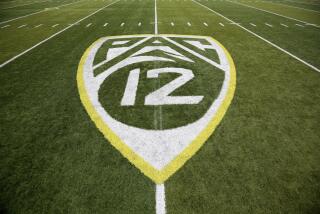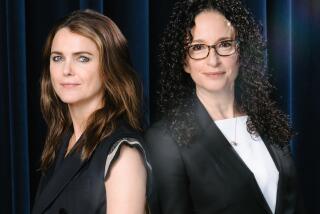Pushing His Students Onto the World Stage
- Share via
The delegate from the People’s Republic of China was taking a verbal beating. Slouched on an old car seat, wearing baggy shorts, finishing up a hamburger, he was trying to explain his country’s position on illegal trafficking in nuclear waste.
But the inquisitor wasn’t buying it. “You’ve got hot air is what you’ve got,” he said.
Such bluntness is rare in the polite, coded discourse of international diplomacy. But it’s common in the classroom presided over by Bob Timberlake at Manhattan Beach’s Mira Costa High School. Timberlake was grilling Daniel Morberg, 16, to prepare him for a simulated United Nations conference, during which he and his classmates would appear as Chinese diplomats.
There was nothing simulated about Timberlake’s intense questioning, however. And, afterward, a somewhat shaken Daniel said he felt like “an idiot.” But, he said, “it just motivates me to work more. It’s kind of toughening.”
Timberlake’s confrontational Socratic method of teaching does make some students uncomfortable at first. It goes against the grain of feel-good pedagogical theories, which say that teachers should create a “safe” environment where students’ opinions go unchallenged. And it’s meant to get their competitive juices flowing--another no-no among some education theorists.
But Timberlake and his students agree that his hard-nosed approach is largely responsible for why the school’s Model United Nations squad is one of the best in the nation and why they traveled last week to the highly competitive national conference in New York.
“He pushes and he pushes and he pushes, but it’s only because he knows we’re capable of it,” said Karen Block, 17, who has been a member of Timberlake’s Model U.N. team for four years.
Model U.N. has a long history, dating to the post-World War I League of Nations, when college students would mimic the debates of diplomats as a learning exercise. These days, about 300,000 students around the world--about half of them of high school age--participate in conferences during which they try to solve the world’s economic, political, environmental, educational and social problems.
The activity is growing in popularity, and its major advocate, the United Nations Assn. of the U.S., is trying to get more schools involved by sponsoring programs in New York, Chicago, Oakland and other cities. Southern California has strong teams at Edison High School in Huntington Beach, and Cerritos and Huntington Beach high schools.
Before a conference, each team is assigned a country, and its members research and write papers explaining their adopted nation’s positions on the issues. It’s not always a big country. At a conference three years ago at Georgetown University, Mira Costa’s team represented Cape Verde, the group of islands off the west coast of Africa. Although the country is obscure and all but powerless on the world stage, Mira Costa swept the conference and won numerous individual and team honors.
The awards--gavels, plaques and national flags--are given for such things as making a good speech, steering a caucus discussion in a direction favorable to your interests or getting a resolution passed. Testifying to the team’s success over the years are the 66 flags, 55 plaques and nearly 200 gavels that adorn the walls of Timberlake’s classroom. In three of the last 10 years, the team has won every conference it attended.
The New York conference is one of the biggest in the country, attracting 220 schools and 2,400 students, all of them determined to make their views known. The team got to eat in the delegates’ dining room at the U.N., lunching with diplomats. They saw a play and visited the site of the World Trade Center disaster site. But the trip, paid for with donations from local service clubs and by parents to help cover the $900 per student cost, was mainly devoted to doing well at the conference.
To make sure they’re ready, Timberlake secures subscriptions to university archives and foreign affairs news services. That helped them learn China’s position on issues large and small.
What’s China’s view of how best to help the Arab world diversify its economy so it’s not so dependent on oil? What role does China play in the small arms trade that’s contributing to the mounting casualties in the civil war underway in Sierra Leone? What’s its record on women’s rights? On unions? Stemming the spread of AIDS in Africa?
“I love it, I absolutely love it,” said Karen, who will attend Union College in upstate New York in the fall. “I love being able to talk to friends about actual issues and not just about, ‘Oh, look at that cute boy.’”
She had to research China’s position on “tele-work,” the growing phenomenon of people working via computer for employers who may be across the country or around the world. She traveled to Ecuador two years ago and wants to work for the government or become a lawyer. “I’ve lived in Manhattan Beach my whole life ... and I really want to get beyond my comfort level,” she said.
As a final step to make sure his team is ready, Timberlake conducts what he calls “roasts,” starting at 6:30 a.m. before school and at 6 p.m. after school and lasting as late as 9 p.m., the week before the conference. The students are all put on the hot seat, just as Daniel was.
“It’s a gut check to see if they’re ready and prepared,” said Timberlake, 46, who has been on the Mira Costa faculty for 15 years. He teaches geography, helps coach the school’s golf team and used to coach its football team.
As he grills the students, Timberlake displays a near-encyclopedic knowledge of world affairs, he cites articles in obscure journals, drops the name of a West African rebel leader, mentions a 1948 treaty in which China bamboozled India and directs students to relevant Web sites. “How can I ask them to know their stuff if I don’t know my stuff?” he asked.
Shy students blossom, once they realize they can stand up to the pressure. “I’ve seen him do it to my kids, and they came away really wanting to prove themselves to him,” said Pam Seaborn, an enthusiastic parent who heads the team’s booster club. “I know personally he really loves these kids and always has their best interests at heart.”
All the hard work paid off again in New York. The team won the conference’s top award. Timberlake loves it when his team wins. But even if they don’t, he said, “The quality of effort they put in, that’s what’s most important to me.”
It may be the most valuable lesson his students learn.
More to Read
Sign up for Essential California
The most important California stories and recommendations in your inbox every morning.
You may occasionally receive promotional content from the Los Angeles Times.










